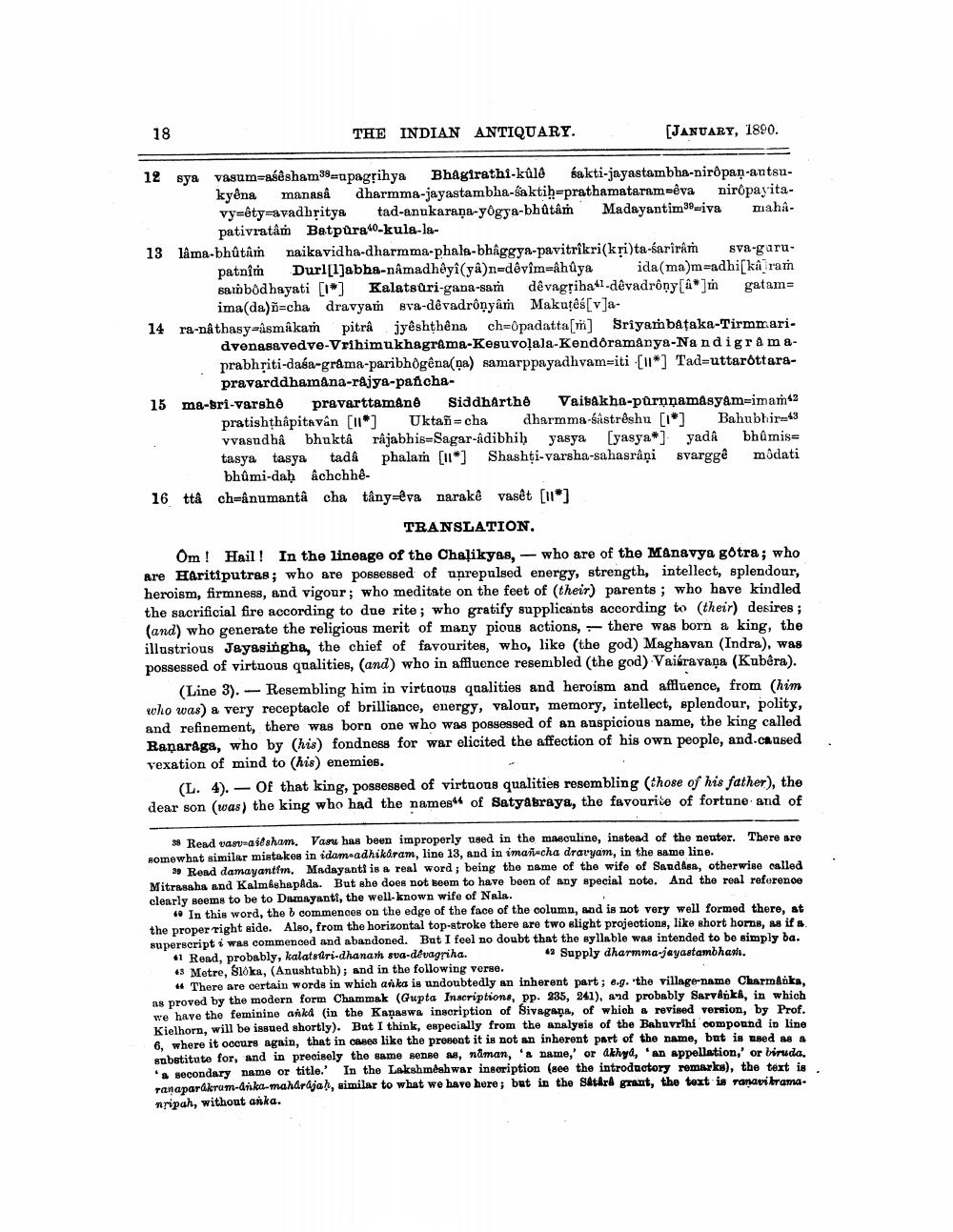________________
18
THE INDIAN ANTIQUARY.
(JANUARY, 1890.
12 sya vasum=aśêsham3-apagrihya Bhagirathi-külé sakti-jayastambha-niropan-autsu
kyêna manasâ dharmma-jayastambha-saktib=prathamataram-êva niropayitavyrêty=avadhritya tad-anukarana-yogya-bhûtâm Madayantim3-iva maha
pativratâm Batpurato-kula-la13 lâma-bhůtan naikavidha-dharmma-phala-bhaggya-pavitrikri(kri)ta-śariram sva-guru
patnam Durl[1]abha-namadhêyi(ya)n=dêvîm=&huya ida (ma)mwadhiska ram saibódhayati [*] Kalatsuri-gana-sam dêvagrihat1.dêvadrông[*] ingatam=
ima(da)ñ=cha dravyam sva-dêvadrôngâm Makuțêś[v]a14 ra-nâ thasy-ismäkam pitrâ jyêshthêna ch=Opadatta[m] Sriyarbațaka-Tirmnari.
dvenasavedve-Vrihimukhagrama-Kesuvoļala-Kendoramanya-Na ndigra maprabhriti-daśa-grama-paribhôgêna(na) samarppayadhvamwiti [11*] Tadăuttaróttara
pravarddhamana-rajya-pancha15 ma-sri-vargho pravarttamane Siddharthe Vaisakha-purnnamasyam=imar42
pratishthâpitavan [11] Uktañ= cha dharmma-sastrêshu [1] Bahubhir 43 vvasudha bhukta rajabhis Sagar-adibhih yasya (yasya*] yada bhůmise tasya tasya tad& phalar [11] Shashti-varsha-sahasråņi svarggé môdati
bhůmi-daḥ achchhê. 16 ttâ ch=anumantâ cha tâny-êva narakê vasêt [ll]
TRANSLATION, Om! Hail! In the lineage of the Chalikyas, - who are of the Manavya gotra; who are Haritiputras, who are possessed of unrepulsed energy, strength, intellect, splendour, heroism, firmness, and vigour; who meditate on the feet of (their) parents ; who have kindled the sacrificial fire according to due rite; who gratify supplicants according to (their) desires ; (and) who generate the religious merit of many pious actions, there was born a king, the illustrious Jayasingha, the chief of favourites, who, like (the god) Maghavan (Indra), was possessed of virtuous qualities, (and) who in affluence resembled (the god) Vairavaņa (Kubêra).
(Line 3). - Resembling him in virtuous qualities and heroism and affluence, from Chim who was a very receptacle of brilliance, energy, valour, memory, intellect, splendour, polity, and refinement, there was born one who was possessed of an anspicious name, the king called Ranaråga, who by (his) fondness for war elicited the affection of his own people, and caused vexation of mind to (his) enemies.
(L. 4). Of that king, possessed of virtuous qualities resembling (those of his father), the dear son (was) the king who had the names of Satyabraya, the favourite of fortune and of
* Read vasuwaitsham. Vasu has been improperly used in the masculine, instead of the neuter. There are somewhat similar mistakes in idam-adhikaram, line 13, and in imarlcha dravyam, in the same line.
30 Read damayantim. Madayantiis a real word; being the name of the wife of Saudioa, otherwise called Mitrasaha and KalmehapAda. But she does not seem to have boon of any special note. And the real reference clearly seems to be to Damayanti, the well-known wife of Nala.
". In this word, the b commences on the edge of the face of the column, and is not very well formed there, at the proper right side. Also, from the horizontal top-stroke there are two slight projections, like short horns, as if s. superscript i was commenced and abandoned. But I feel no doubt that the syllable was intended to be simply ba. 41 Read, probably, kalatsiri-dhanam sva-devagriha.
Supply dharmma-jayastambhanı. 48 Metre, $10ka, (Anushtabh); and in the following verse.
# There are certain words in which anka is undoubtedly an inherent part; e.g. the village-name Charronka, as proved by the modern form Chammak (Gupta Inscriptions, pp. 235, 241), and probably Sarvanka, in which we have the feminine arka (in the Kapaswa inscription of Sivagapa, of which & revised version, by Prof. Kielhorn, will be issued shortly). But I think, especially from the analysis of the Bahavrihi compound in line 6. where it occurs again, that in cases like the prosent it is not an inherent part of the name, but is need as A substitute for, and in precisely the same sense as, naman, 's name,' or Akhya, 'an appellation,' or biruda,
secondary name or title. In the Lakshmeshwar insoription (see the introductory remarks), the text is ranaparákrum-Anka-maharajah, similar to what we have here; but in the Satira grant, the text is ranavi brama. aripah, without anka.




